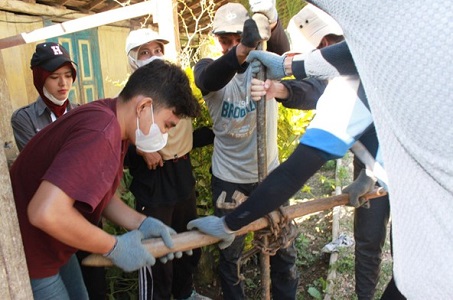Overcoming Waste Problems, the IPB University Innovation KKN-T Team Initiated the Making of Biopore Infiltration Holes

Garbage is one of the problems in Palon Village, Jepon District, Blora Regency, Central Java Province. In answering this problem, the IPB University Innovation Real-Thematic Work Lecture (KKN-T) team initiated the making of biopore holes as an effort to deal with organic waste.
Alya Putri Azhari, an IPB Innovation KKN-T student in Palon Village, revealed that the activity began with socialization which consisted of waste sorting material, making biopore holes and making liquid organic fertilizer (POC).
In this socialization, the areas that will become pilots for making biopori were determined, namely RT 04, RW 03, Palon Village. Biopores are made in groups. Each group consists of 2-4 households. Overall, there are 10 groups that will become pilots for making biopori.
“Biopore holes are made by digging the ground vertically as a water absorption method which is useful for dealing with stagnant water. Biopori can increase water absorption. The biopori hole is equipped with a pipe that has been perforated. The top of the pipe cover is perforated to speed up decomposition," Alya explained.
She explained, biopori can be harvested in approximately three months after the holes are made. Harvesting is done by removing the pipe from the hole. The organic fertilizer in the pipe is then removed so that it can be used. On the other hand, to speed up harvesting, you can use E4 or molasses.
The construction was carried out with the Palon Village community using a drill and crowbar. It is hoped that after this work program is implemented, the people of Palon Village can sort organic and inorganic waste on an ongoing basis and practice making biopores independently. (*/Rz) (IAAS/Res)



